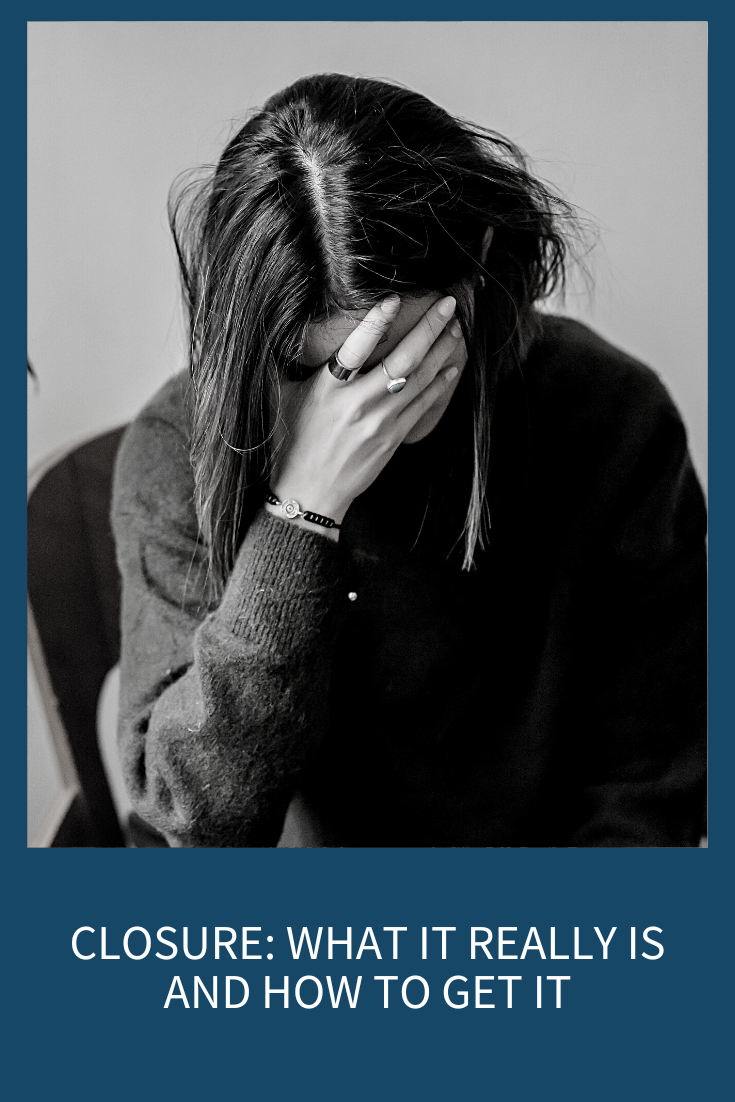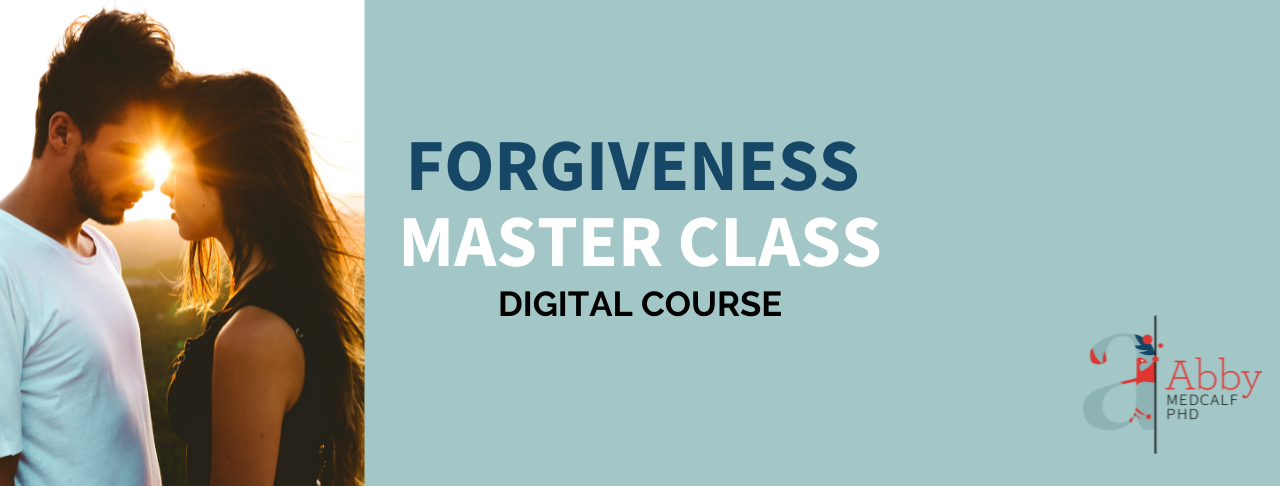
So many of my clients come to therapy looking for some type of closure. From breakups to being fired to getting over childhood trauma, it’s a common human condition to look for endings or bad events to be explained and wrapped up so you can move on. But can you ever do that, and if you could, would it actually help in the way you’re hoping? Today I’m teaching you what closure really is, the three reasons why what you’re doing hasn’t worked, and my three-step process for finding closure for real.
10-minute read
Here are some of the more common things I hear my clients say:
- “If they would just tell me why they’re not talking to me anymore…”
- “I need to know the real reason our relationship ended.”
- “Why did she ghost me after three amazing dates?!”
- “Now that we’re broken up, I need to tell him all the things I was holding back, or I’ll never be happy.”
- “If they would just tell me they’re sorry…”
- “I’ll never find peace if I don’t get over my childhood hurts.”
You think that closure is the only way you’ll be able to move on and be happy. You’re right that some type of closure is needed, but you’re wrong to think closure includes anything from anyone else.
What is Closure?
Social psychologist Arie Kruglanski, a distinguished professor at the University of Maryland, first coined the phrase, need for closure, in the 1990s. He referred to a need for closure as “a framework for decision-making that aims to find an answer on a given topic that will alleviate confusion and ambiguity.”
In other words, we’re trying to resolve painful feelings that some emotional trauma or loss has created. We do that by trying to make sense out of the situation. And we want to make sense out of the situation because we think we’ll feel better, and we think it’ll safeguard us from ever being in this situation again.
Kruglanski introduced The Need for Closure scale in 1994. The scale rates closure on a continuum with a high need on one end and another end where people avoid closure at all costs. Believe it or not, your Need for Closure is only slightly affected by your circumstances. In other words, it’s not about the severity of what happened; it’s about your own personality and way of viewing the world. So, one person might get cheated on and just move on. They might think that they’ve dodged a bullet and are thankful just to get away and find someone who they can trust, while another person wants to dig down and find out all the reasons why their partner cheated, what exactly they did and when, and want to discuss it with their partner non-stop.
And this is the secret to understanding and getting closure! It’s about working on yourself, not the other person. It’s about focusing on your own healing and growth as opposed to obsessing about the other person.
Three Reasons Why Closure Doesn’t Work When You Focus on the Other Person
#1: It’s About You, Not Them
What the research has shown is that people who score high on Need for Closure appear to have a more obsessive personality type (which can look like very high anxiety), a higher need for predictability and structure, some rigidity, and a deep dislike of any uncertainty or ambiguity.
Because of this, when you focus on getting what you need from someone else, it rarely (if ever) works because you’re still you! I can’t tell you how many people I’ve worked with over the years who, even when they were given reasons for a breakup or getting fired, still obsessed about it and wanted more and more answers! It was never enough, and this is why: you need to work on your own issues and stop focusing on someone else telling you something that’s going to make it all better.
#2: Closure doesn’t help and can even make it worse!
According to the research, it’s unlikely that attempts at closure (even if the other person says “yes” to a request) will have any kind of positive outcome. In fact, it’s likely that trying to achieve closure will actually worsen the conflict, create new problems, inflame your insecurities, and create more anger and resentment!
For example, if your partner breaks up with you and you ask why (because you want closure), when they tell you why you’ll likely argue and maybe not even believe the reasons they’re giving you. Or, you might feel horrible about yourself and beat yourself up, given what they say. “I screwed this all up. What’s wrong with me?! I’ll never find love!”
Not only that, other research shows that having a high need for closure can greatly affect your ability to make the choices you need to make that would help you move forward and heal. So, all this focus on closure is clouding your rational thinking and creating more roadblocks to actually moving on and feeling healed about the situation or person.
#3: Needing Closure is Driven by Fear
Here’s the bottom line. Your need for closure is driven by your fear-based brain. You’re in pain and want it to stop. You’re angry, hurt, resentful, sad, or frustrated, and you think this outside thing will make all those feelings go away.
You’re looking for some satisfactory explanation. You’re searching for answers and for the other person to take ownership and be accountable. You want an apology or appreciation. All of this is driven by fear. Other people can’t make you happy or give you peace. That’s an inside job. Sure, maybe you can feel better for a moment, but then all the doubt creeps back in. It’s a temporary fix.
You know this is true because you’ve been in situations where someone said they were sorry, but then you kept bringing up the issue because it was still bothering you. You need to hear it over and over again because you’re still hurting. Maybe in your mind, they haven’t suffered as much as you (so not enough), or they seem to have moved on too quickly after an apology. This is your fear-based brain in control, where sorry is never enough.
Wanting closure is often about other fear-based emotions too. Maybe you want revenge, retribution, or you’re just angry at them and want to keep “making them pay” by saying they’re sorry. You’re feeling rejected, abandoned, or dismissed and want them to make you feel better. You’re not getting peace when this is your motivation which is why closure doesn’t generally work. You can’t have a love solution when fear is the driver.
In the end, when you’re waiting for closure, you’re handing over your personal power, self-esteem, self-confidence, and self-efficacy to another person. You end up with no power, and they have it all.
Why Closure is Important
All of this is not to say that closure isn’t important; it is! You just need to understand that it’s about your own internal work, not depending on someone else. Closure is important because:
- Where you end this relationship, you’ll begin the next, so you want to end it well in your own head
- You need to know you can trust yourself when you make future decisions
- You want to take personal responsibility where needed, so you can feel empowered
- If it’s due to childhood trauma, closure will be part of the process of creating more in your life now that’s not based on past hurts.
Three Steps to Closure
Step One: Make a commitment
Make a commitment to stop focusing on anyone else when it comes to closure. Commit to your own healing and do the work you need to do to get there. When you find yourself focusing on the other person, bring your awareness back to yourself and have a mantra at the ready: “My healing is my responsibility, and I will absolutely make that happen. I will be better, not bitter.”
Step Two: Focus on broadening your resources
I was a guest on another podcast recently, and the person interviewing me said something about how important it is to uncover old, limiting beliefs and issues so we can heal them. His idea was that only from dissecting them could you heal.
He said that the reason new, healthy tools and tips often didn’t work with people was because they hadn’t fully understood and cleared these old hurts. He said, “You can’t fill an already full cup.” I get what he means. If your cup is full with all these old hurts and issues, how can you add anything new?
I (lovingly) disagreed and said, “It’s not about emptying the cup; it’s about making a bigger cup.” When all you focus on is your hurt, you don’t end up creating change. This is because you feel the way you think. You’re thinking about a hurtful person or situation (over and over again), and you start feeling angry, resentful, sad, hopeless, and overwhelmed. No problem-solving or forward momentum happens from there.
Instead, we want to first think about all the ways we can make our cup bigger so that the hurt becomes just a small part of all the things in that bigger cup. As we gain clarity and get some wins under our belt, we start to feel stronger and happier. Now when I look at finding closure and resolving an old hurt, I have a much different and more positive (and realistic) viewpoint about that thing.
How to make your cup bigger is up to you, but it’s basically making the other parts of your life happier and more connected. Here are some ideas:
- Get into therapy to look at your life overall and see what patterns you might have, and learn how to stop repeating them
- Deepen your friendships. Spend more quality time with friends and talk about your hopes and dreams (not closure with this person)
- Get deep on practicing mindfulness so that you can notice when you start thinking about this other person or situation and bring yourself back to the present where you have power to make your life what you want
- Make a commitment to move your body every day
- Take up a hobby, finally learn another language, or learn a new sport
- Read inspirational books
- Start a spiritual practice daily
Step Three: Write a new story and/or work on forgiveness
If the thing or person you want closure with is related to a breakup, loss of a job, or something similar, I would encourage you to write a new story. However, if you want closure related to trauma such as abuse, violence, rape, or something similar, writing a new story would be at the end of that journey, and I would encourage you to take the steps to work on forgiveness (don’t worry, dealing with your anger is first on that path).
If you’re choosing to write a new story, I’d start with writing a letter that you don’t plan to send to the other person. However, this letter needs to be done in a very specific way! Research has shown that writing a letter where you’re trying to search for meaning, explanations, or answers is not helpful.
However, research has shown that writing a letter to the other person through what’s called a redemptive lens can be very beneficial. You want to write a letter that focuses on the positives and doesn’t blame the other person.
What have you learned from this situation, person or relationship? What have you gained from the experience? In what way could you reframe or rewrite the story where it’s not about you or the other person being wrong, bad, or stupid but where this is a learning experience or has brought you to a different understanding of yourself?
If you want to go straight to the forgiveness route, I’ve done multiple episodes (links in the show notes) you can check out.
Resources for Closure: What it Really is and How to Get it
How to Stop Overthinking and Let Things Go that Bother You
How to Forgive Someone Who Hurt You in 5 Steps
The 3 Strategies for Forgiveness
Forgiveness is a Choice: Interview with Dr. Robert Enright
Research for Closure: What it Really is and How to Get it
Arie W. Kruglanski, The Need for Closure Scale
Arie W. Kruglanski, Uncertainty, the Need for Closure and Conservatism








